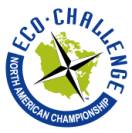Eco-Challenge
The topic of this article may not meet Wikipedia's general notability guideline. (August 2010) |
| Eco-Challenge | |
|---|---|
 | |
| Genre | Reality |
| Created by | Mark Burnett |
| Country of origin | United States |
| Original language | English |
| No. of seasons | 9 |
| No. of episodes | 36 |
| Original release | |
| Network | USA Network |
| Release | April 1, 1995 – April 11, 2002 |
Eco-Challenge: The Expedition Race is a multi-day expedition length adventure race in which teams of four compete. It aired from April 1995 to April 2002.
Overview
Eco-Challenge was created in 1992 by Mark Burnett. Inspired by a Los Angeles Times article about Gerald Fusil's Raid Gauloises adventure race in Costa Rica, Burnett formed a team and competed in two Raid Gauloises events. Although his teams did poorly, Burnett decided to create a similar race in North America. When the race went international, Burnett purchased the rights from Fusil and set out to make the Eco-Challenge the world's premier adventure race.
Each team comprised a mandatory mix of both men and women, racing non-stop, 24 hours a day, over a rugged 300-mile (500 km) course, participating in such disciplines as trekking, whitewater canoeing, horseback riding, sea kayaking, scuba diving, mountaineering, camel-back riding, and mountain biking. Teams originally consisted of five members, but the team size was reduced to four members early in the event's history.
The first Eco-Challenge was held on April 25, 1995, in the Utah desert and was held each year in a new locale until 2002. Burnett recently noted that he did not intend to hold another Eco-Challenge, but had considered selling the rights to it.[citation needed] In contrast, other expedition-length races, including Primal Quest and the infamous Patagonian Expedition Race continue to be held.
Television history
Each Eco-Challenge was broadcast on cable television. The 1995 Utah race was shown as a 45-minute feature , produced by and broadcast on MTV.[1] The 1995 Maine/New England event was broadcast in segments as part of the Extreme Games broadcast on ESPN. Starting in 1996, Eco-Challenge was aired on the Discovery Channel and the production enjoyed a significantly expanded budget. The 1996 British Columbia production, broadcast on the Discovery Channel won an Emmy Award. In 2000, the USA Network agreed to a three-year contract to broadcast the Eco-Challenge. Later that year, the show was nominated for a Prime-Time Emmy Award. USA did not renew the show after the 2002 Fiji race.
Although long out of print, the 1996 through 2001 Eco-Challenge races were released on VHS by Discovery soon after the shows aired.[2] The Utah, Maine/New England, and Fiji episodes were never officially released in the United States.
In 2011, Burnett sold Expedition Impossible, a reality show with a similar concept to Eco-Challenge, to ABC as a summer series. The new show debuted on June 30 of that year.
Events
- 1995 Utah
- 1995 Maine/New England (as part of the X-Games X-Venture adventure race)
- 1996 British Columbia
- 1997 Australia
- 1998 Morocco
- 1999 Argentina
- 2000 Sabah, Borneo
- 2001 New Zealand
- 2001 U.S. Armed Forces Challenge (benefiting TAPS)
- 2002 Fiji
See also
Sources
- ^ http://www.tv.com/Eco-Challenge/Utah+1995/episode/281808/cast.html
- ^ Example the British Columbia race was published in 1997 on 3 tapes composed of five episodes: Tape 1: "The Gathering", "Fire and Ice"; Tape 2: "Breaking Point", "The Storm" and tape 3: "The Prize". ISBN's for each tape are respectively: 1-57523-252-9, 1-57523-250-2 and 1-57523-251-0
- Articles with topics of unclear notability from August 2010
- Adventure racing
- American reality television series
- 1995 American television series debuts
- 2002 American television series endings
- 1990s American television series
- 2000s American television series
- USA Network shows
- English-language television programming
